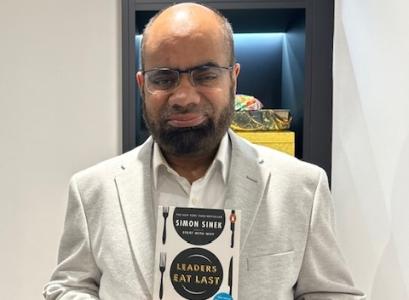
As part of Bedford Borough Council’s Year of Reading, we are asking every councillor to tell us about one of their favourite books.
And this week we spoke to Councillor Mahboob Din, Councillor for Queens Park who chose Leaders Eat Last by Simon Sinek. He described the 2014 book as teaching “the importance of effective leadership, empathy and transparency in building strong relationships with employees,” adding “It is all about connecting with your employees.”
He said; “The book is based on leadership and how to be a better leader. The title originates from the United States Marine Corps, around how the highest-ranking officer of the group always eats last. This is to make sure the people he is leading are in the best shape and that they get enough to eat.
“The idea of the leader eating last is a military approach. It was amazing to see all the examples of how this leadership quality can extend into the business world to make leadership more effective, and to increase the quality of work carried out by their teams.”
He added; “There is a theory within the book which is around circle of safety. This is a theory from the 40s which is ‘The closer you are to the boss, the closer you will be to the inner circle. The closer you are the more protection you have from being sacked or let go of if the need to reduce staff ever comes’.
“The book is an interesting read for business entrepreneurs, people in the workforce and leaders / aspiring leaders. It gives you an understanding of how to become an effective leader with bringing positive energy into workforce teams. For me, it’s all about the approach of working with your teams and not showing your superiority.”
And Councillor Din cited one particular quote from the book which he realised summed up the need for balance in leaders; “Some believe we should always put others first—that if we don’t look out for the group, the group won’t look out for us. Others believe we should always put ourselves first and that if we don’t take care of ourselves first, then we would be of no use to anyone else.
“The fact is, both are true.”
